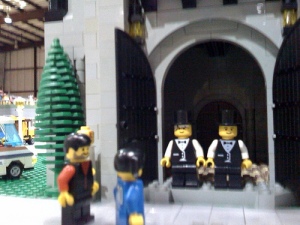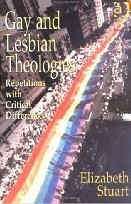Explores questions of faith for lesbian, gay and trans Christians, and celebrates progress towards full LGBT inclusion in church.
Thursday 29 October 2009
Queer by Any Other Name: Mark Jordan on Terminology
Thursday 22 October 2009
Gay Marriage – in Church: Sweden

Monday 13 July 2009
My Homoerotic Retreat: Six days that changed my life.
(In offering the story below, I do so with some trepidation. I know that many readers will be sceptical or cautious, may even find it ridiculous. I myself, given my particular background in faith and religious temperament, would have been made distinctly uncomfortable if any of my friends had asked me to take such a story seriously. Still, I think it is time to share it. I leave you to decide for yourself: was this a genuine mystical experience, as my eminently well qualified spiritual directors believed? Or was I just suffering from some kind of spiritual delusions of grandeur? Make up your own mind.)
During Advent of 2002, I underwent a 6 day directed retreat which turned out to be the most extraordinary spiritual, even mystical, experience of my life, which in certain key respects fundamentally changed my outlook on faith.
Background & Context
As the experience really was remarkable, sounding like an account that I myself would previously have dismissed as ramblings from the sentimental / superstitious wing of Catholicism, I want to begin by setting out my prior religious / spiritual background, as well as the context in which I began my retreat. This will provide both context and contrast for what followed.
After drifting away from the church during my twenties as a married man, I later came out as a gay man. Ironically, it was only after setting up in a committed long gay relationship that I was moved to return to the church. The parish I then joined was led by Jesuit priests, and in time I began to explore the Ignatian approach to spirituality, by way of increasingly heavy involvement in the CLC – “Christian Life Community”. In spite of this involvement, I did not see myself as particularly “religious” (a word I detest), nor “spiritual”, with all its connotations of “piety” and mysticism. I simply knew that I enjoyed profound satisfaction in setting aside time for quiet reflection on my life. My take on all matters of faith was primarily cerebral. (I was distinctly uncomfortable with the more ostentatious displays of images and relics, of novenas and special prayers “guaranteed” to bring results, or of mystical voices and apparitions.) I did, however, find value in the Jesuit emphasis on balancing the promptings of head and heart, and on the value of paying attention to experience. I became of convinced of the truth that Prayer is not just about speaking to God asking for favours, but also of attempting to listen. I knew that by proper attention to the discernment of spirits within, one could, with care and imperfectly, hear the voice of the Lord speaking directly to us.
The context for this retreat was that after a long period of careful discernment, my partner and I had taken the important decision to leave South Africa, the only country I had ever known, to take up teaching posts in the UK – a country which I had never even visited. This was to be my final Christmas in South Africa, and the decision lay heavy on my mind. I was also reoccupied with the nature of my gay relationship. I had repeatedly considered the issue of homosexuality in prayer and under spiritual direction, and was comfortable that there was nothing immoral or reprehensible in our relationship. Still, I was just a little bothered by the possibility that perhaps after all, I was fooling myself, making excuses and rationalising away some inner doubt. So I was looking for final reassurance on two key questions in my life: the decision to emigrate, and my status as a sexually active gay man in the church.
Saturday 27 June 2009
Sharing our Stories

It was very much in that spirit that I launched this site 6 months ago, so I was delighted earlier today to find a comment posted by Jeremiah, with some kind words, but also noting:
"...as Jim Alison teaches, we are NOT manifestations of a 'disorder'; and therefore, our insights, our experience, our unique and gay approach to the Gospel have great value.In that gay spirit I've just launched a site for shared reflections and experience."
Friday 29 May 2009
Marriage Equality & the Church - Sweden
Wednesday 11 March 2009
Catholic 'Dissent', obedience
"Who made you?But by the time I reached secondary school, Vatican II was in progress, enthusiastically embraced by the preist who taught me RE for the next 5 years. I never again saw that little catechism.
God made me."
"Why did God make you?
To know Him, to love Him, to serve Him in this world, and to be happy with Him forever in the next."
Tuesday 3 March 2009
Saturday 10 January 2009
"Christianity is a Queer Thing" - Elizabeth Stuart

Monday 5 January 2009
Books: Where to Begin?
The question matters. You need to be clear on whether you want a simple introduction, a general but comprehensive overview for playpeople, or a scholarly tome filled with notes, sources and all the necessary qualifications, ifs and buts. Are you looking for approaches rooted in scripture, or Church teaching, or both? From a gay male, lesbian, or trans perspective? All these questions, and more, will influence your choice. In my detailed posts for each book, I have attempted to provide answers to these questions. The labels included in each post will help you to find books on a specific topic. With time, I will be building in thematic lists, a search engine, and other means to access exactly what you personally will find helpful - but all these refinements take time, while I am simultaneously trying to expand the number and range of books included. I crave your patience.
In the meantime, I offer some suggestions of what might be the most useful for specific purposes.
For a very simple, introductory overview of Scripture and Church teaching, I was impressed by "The Bible, The Church and Homosexuality", by Nicholas Coulton. Written from an Anglican perspective, but is also more widely applicable.
Also tackling both Scripture and Church teaching, but going into more detail, former Jesuit John McNeill's "The Church and the Homosexual", was one of the very first and is still a classic. "A Question of Truth" by the Dominican priest Gareth Moore covers much the same ground, and is much more recent.
On Scripture specifically, I think the best for the general reader is "Dirt, Greed and Sex" by the Episcopalian L. William Countryman. For a later, more Evangelical approach to the same subject, read Eugene Rogers, ...If you are ready to tackle a more academic treatment bristling with footnotes, then read the chapter on Scripture in the landmark "Christianity, Social Tolerance and Homosexuality" by John Boswell. (This is also of fundamental importance for gay church history, and the development of theology). If you are put off by the excessive footnotes and Greek & Latin quotations, you will find summaries of his arguments in many of the other books).
The Catholic priest, theologian and psychotherapist Daniel Helminiak has written that McNeill, Countryman and Boswell (noted above) were the three books that nmost influenced his own thinking and understanding. Helminiak's "What the Bible Really Says About Homosexuality". Helminiak's book is often listed alongside those three.
It is important though not to get bogged down in biblical studies of homoeroticism by dealing only with fending off the oppressive texts of terror. There are many ways in which we, like all other Christians, can read scripture for its positive inspiration. "Take Back the Word" (edited by Robert Goss) does just that.
An important set of books "from a perspective Catholic and gay" are more difficult to classify. These are the series by the theologian and former Dominican James Alison. These are undoubtedly works of "theology", but the word is misleading, with its associations of ancient, scholastic tomes. Alison's books are tightly reasoned, but presented in an informal, chatty style, as a series of reflections on God, and on what it means to be both gay and Catholic. These are all popular and highly recommended. Start with the first in the series: "Faith Beyond Resentment: Fragments Catholic and Gay."
Faith is incomplete without prayer. The Presbyterian Chris Glaser has several books on prayer for gay men and lesbians. A good one to begin with is "Coming Out to God" - which is a good way to think of starting our queer faith journey.
Finally, two books by Catholic priests which offer a completely fresh, unfamiliar take on the awkward question of sexual ethics: "Sex and the Sacred" by Daniel Helminiak, and "Sex as God Intended", by John McNeill.
(Note:




